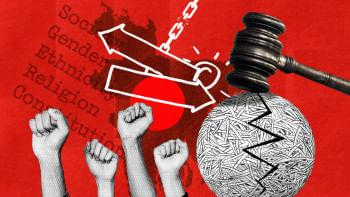Can pluralism replace secularism in Bangladesh?

The proposal to replace secularism with pluralism in Bangladesh's constitution has sparked significant debate, touching on issues of governance, social harmony, and the state's commitment to equality. While pluralism as a concept offers a promising framework for fostering inclusivity and mutual respect in a diverse society, the practical implications of this shift warrant careful scrutiny. Without clear and enforceable measures, such a transition could jeopardise the country's religious harmony and undermine the principles of equality that have long been embedded in its constitutional framework.
Pluralism, by definition, emphasises the recognition and celebration of diversity, promoting coexistence among different religious, cultural and ethnic communities. In a country like Bangladesh, where multiple religions and cultures coexist, the adoption of pluralism could theoretically enhance social cohesion and inclusivity. It acknowledges the diversity of the nation and seeks to create a society where all groups feel respected and represented. Unlike secularism, which often connotes a strict separation of religion and state functions, pluralism actively embraces the presence of diverse beliefs and traditions within the public sphere. This could pave the way for policies and practices that reflect the multicultural realities of Bangladesh, strengthening the social fabric and fostering a sense of belonging among all citizens.
However, this vision of pluralism faces significant challenges in the context of Bangladesh. One issue is the constitutional recognition of Islam as the state religion. While this provision reflects the demographic reality of Bangladesh, where the majority of the population identifies as Muslim, it creates an inherent contradiction with the principles of pluralism. Pluralism requires equal respect and treatment for all religions, yet the designation of a state religion can be perceived as privileging one faith over others. This tension risks alienating religious minorities and undermining the very inclusivity that pluralism seeks to promote.
Bangladesh's historical context further complicates the matter. The principle of secularism was enshrined in the country's constitution in the aftermath of the Liberation War, reflecting a commitment to religious equality and freedom. This ethos was seen as a rejection of the communalism that had plagued the region during the Partition. Over the years, secularism has been regarded by many as a cornerstone of Bangladesh's national identity, symbolising the aspiration to rise above religious divisions and ensure equal rights for all citizens. Replacing secularism with pluralism could therefore be perceived as a departure from this foundational principle, potentially alienating segments of society who view secularism as integral to the nation's identity.
Another significant challenge lies in the risk of misinterpreting or selectively implementing pluralism. Without clear constitutional safeguards and robust enforcement mechanisms, pluralism could become a vague idea rather than a practical reality. Ambiguity might allow the majority group to dominate the narrative, marginalising minorities under the guise of promoting diversity. For instance, policies or practices that ostensibly celebrate cultural diversity could end up favouring the majority religion or culture, perpetuating existing inequalities. Such outcomes would not only undermine the principles of pluralism, but also exacerbate social tensions and distrust among different communities.
Education and awareness are crucial to addressing these challenges. Schools and educational institutions should play a central role in promoting pluralistic values, challenging prejudices, and fostering empathy among students from an early age. By emphasising the importance of coexistence and mutual respect, education can lay the foundation for a more inclusive society. However, achieving this goal will require significant reforms in the education system, including the development of curricula that reflect the country's diversity and promote critical thinking about issues of identity and equality.
A strong legal framework is also essential for ensuring that pluralism translates into tangible protection for all citizens. Anti-discrimination laws must be strengthened to address inequalities and prevent hate speech, violence or other forms of bias based on religion, ethnicity or culture. These laws must be complemented by mechanisms for their effective enforcement, including independent institutions to investigate and address grievances. Moreover, the judiciary and law enforcement agencies must be trained to uphold these principles impartially, ensuring that all citizens, regardless of their background, can access justice and feel protected by the state.
Equitable representation is another critical aspect of pluralism. To truly reflect the diversity of Bangladesh, minorities must be adequately represented in political institutions, public services, and decision-making processes. This includes not only ensuring their presence but also creating an environment where their voices are heard and their concerns are addressed. Such representation can help bridge divides, foster trust, and promote policies that benefit all communities. However, achieving this requires a sustained commitment to affirmative action and other measures that address structural inequalities.
The success of pluralism also hinges on the protection of religious freedom, which entails not only the right to practise and propagate one's religion but also the freedom to celebrate cultural traditions and beliefs without fear of discrimination or persecution. Bangladesh's commitment to international human rights standards provides a framework for upholding these principles, but their implementation requires political will and societal support. Public awareness campaigns, community dialogues, and other initiatives can help build consensus around the importance of religious freedom and its role in fostering a harmonious society.
Despite its potential benefits, replacing secularism with pluralism poses significant risks if not accompanied by clear and enforceable measures. Having a state religion, in particular, presents a paradox. Without addressing this issue, the transition risks becoming a symbolic gesture, rather than a transformative change.
Md Abbas is a journalist at The Daily Star. He can be reached at [email protected].
Views expressed in this article are the author's own.
Follow The Daily Star Opinion on Facebook for the latest opinions, commentaries and analyses by experts and professionals. To contribute your article or letter to The Daily Star Opinion, see our guidelines for submission.

 For all latest news, follow The Daily Star's Google News channel.
For all latest news, follow The Daily Star's Google News channel. 








Comments